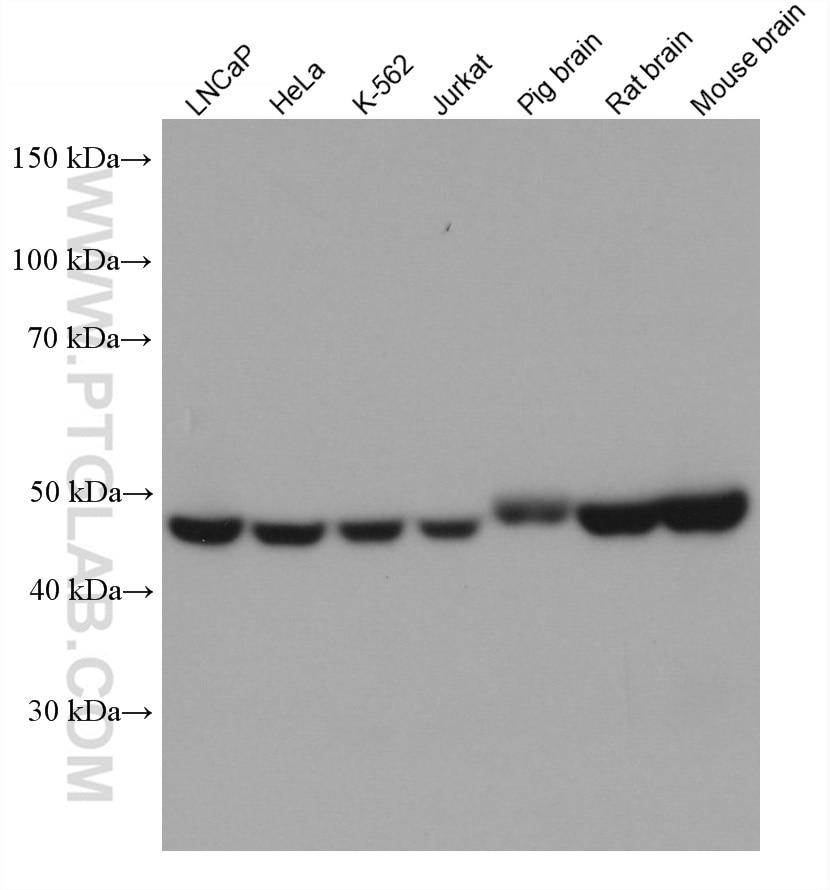Validation Data Gallery
Tested Applications
| Positive WB detected in | LNCaP cells, Hela cells, K-562 cells, Jurkat cells, pig brain tissue, mouse brain tissue, rat brain tissue |
Recommended dilution
| Application | Dilution |
|---|---|
| Western Blot (WB) | WB : 1:5000-1:50000 |
| It is recommended that this reagent should be titrated in each testing system to obtain optimal results. | |
| Sample-dependent, Check data in validation data gallery. | |
Published Applications
| WB | See 1 publications below |
Product Information
67888-1-Ig targets UQCRC1 in WB, ELISA applications and shows reactivity with Human, mouse, rat, pig samples.
| Tested Reactivity | Human, mouse, rat, pig |
| Cited Reactivity | human |
| Host / Isotype | Mouse / IgG1 |
| Class | Monoclonal |
| Type | Antibody |
| Immunogen |
CatNo: Ag17506 Product name: Recombinant human UQCRC1 protein Source: e coli.-derived, PET28a Tag: 6*His Domain: 159-480 aa of BC009586 Sequence: SQIEKERDVILREMQENDASMRDVVFNYLHATAFQGTPLAQAVEGPSENVRKLSRADLTEYLSTHYKAPRMVLAAAGGVEHQQLLDLAQKHLGGIPWTYAEDAVPTLTPCRFTGSEIRHRDDALPFAHVAIAVEGPGWASPDNVALQVANAIIGHYDCTYGGGVHLSSPLASGAVANKLCQSFQTFSICYAETGLLGAHFVCDRMKIDDMMFVLQGQWMRLCTSATESEVARGKNILRNALVSHLDGTTPVCEDIGRSLLTYGRRIPLAEWESRIAEVDASVVREICSKYIYDQCPAVAGYGPIEQLPDYNRIRSGMFWLRF 相同性解析による交差性が予測される生物種 |
| Full Name | ubiquinol-cytochrome c reductase core protein I |
| Calculated molecular weight | 480 aa, 53 kDa |
| Observed molecular weight | 45 kDa |
| GenBank accession number | BC009586 |
| Gene Symbol | UQCRC1 |
| Gene ID (NCBI) | 7384 |
| RRID | AB_2918644 |
| Conjugate | Unconjugated |
| Form | |
| Form | Liquid |
| Purification Method | Protein G purification |
| UNIPROT ID | P31930 |
| Storage Buffer | PBS with 0.02% sodium azide and 50% glycerol{{ptg:BufferTemp}}7.3 |
| Storage Conditions | Store at -20°C. Aliquoting is unnecessary for -20oC storage. |
Background Information
UQCRC1(Cytochrome b-c1 complex subunit 1, mitochondrial), also named as QCR1 and UQCR1, is a ubunit of the cytochrome bc1 complex (complex III) of the mitochondrial respiratory chain, may mediate the formation of the complex between cytochromes c and c1. The gene encodes a 53 kDa protein with a 34 amino acids transit peptide. It is associated with apoptosis or inhibition of cancer cell growth.
Protocols
| Product Specific Protocols | |
|---|---|
| WB protocol for UQCRC1 antibody 67888-1-Ig | Download protocol |
| Standard Protocols | |
|---|---|
| Click here to view our Standard Protocols |

